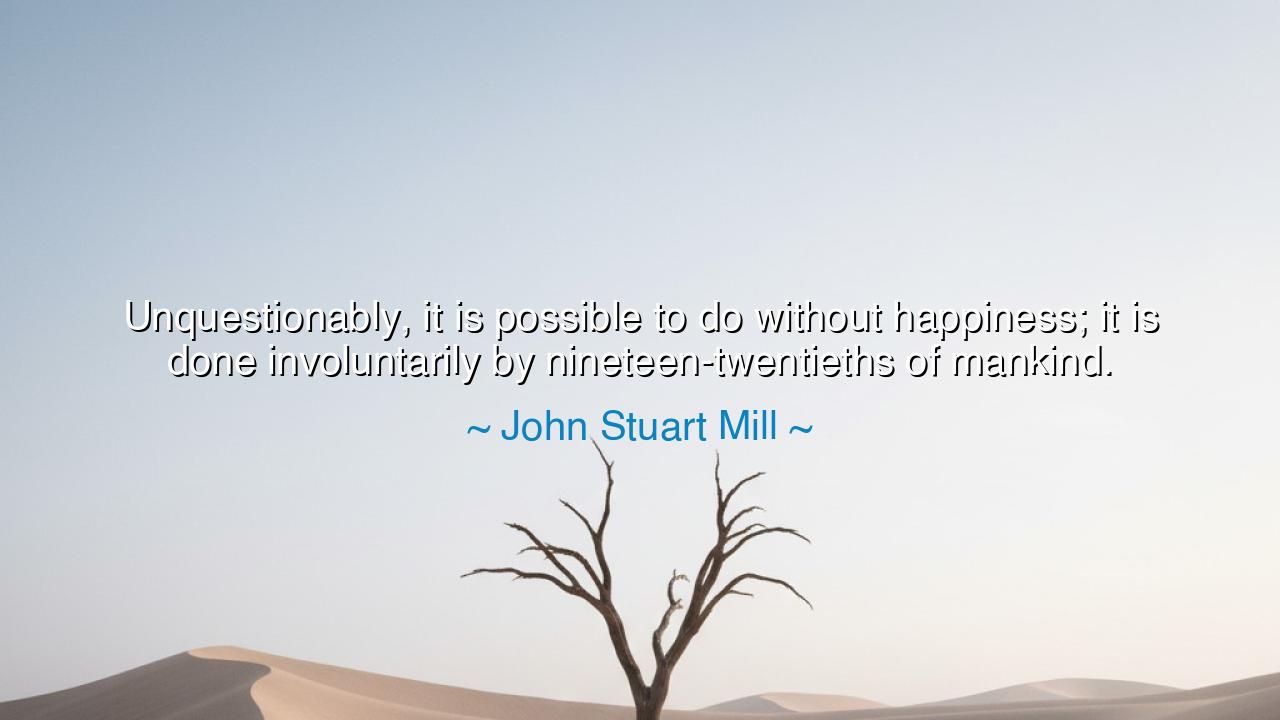
Unquestionably, it is possible to do without happiness; it is
Unquestionably, it is possible to do without happiness; it is done involuntarily by nineteen-twentieths of mankind.






In his austere yet deeply human observation, John Stuart Mill declares: “Unquestionably, it is possible to do without happiness; it is done involuntarily by nineteen-twentieths of mankind.” These words, born from the mind of a philosopher who wrestled with both intellect and emotion, strike like a bell in the quiet halls of history. Mill, a champion of liberty and the pursuit of human good, here acknowledges the sorrowful truth that most of humankind lives not in joy, but in endurance. His words are not cynical, but sorrowfully wise — a recognition that while happiness is the ideal of philosophy, resignation is the reality of life.
To understand this truth, one must first know the man who spoke it. John Stuart Mill, raised in the furnace of reason by his father James Mill and the philosopher Bentham’s utilitarian creed, was trained to live for the “greatest happiness of the greatest number.” Yet, in his youth, he fell into despair — a crisis of the soul that made him question whether the very pursuit of happiness could ever bring it. When he recovered, he saw clearly what few philosophers had dared admit: that most people, bound by poverty, duty, or sorrow, live not for happiness, but for necessity. They rise each morning not to seek joy, but to survive, and in this survival they perform an unspoken act of courage.
Mill’s words expose the cruel irony of civilization. Though we build systems, nations, and creeds that promise well-being, happiness eludes the multitude. The laborer who toils in the field, the mother who works without rest to feed her child, the soldier who endures the terror of battle — none of them live in happiness as the philosophers define it. Yet, they live with strength, perseverance, and duty, and these, though lesser in pleasure, are greater in dignity. Happiness, Mill implies, may be rare, but meaning — the will to continue despite its absence — is universal. The world stands not on joy, but on endurance.
Consider the story of Viktor Frankl, a man of a later age who survived the horrors of the Nazi concentration camps. He wrote that those who endured were not necessarily the happiest or strongest, but those who found purpose in suffering — those who said, “Life still expects something of me.” In them, Mill’s insight comes alive: they lived without happiness, but not without hope or resolve. They found in pain a strange nobility, a kind of spiritual courage that surpasses pleasure. The absence of happiness did not break them; it purified them. So too, the millions Mill speaks of — the “nineteen-twentieths” — though deprived of comfort, hold the world together by their unyielding endurance.
Mill’s quote is not a lament, but a call for compassion and humility. He asks us to see the silent heroism in the ordinary. The great mistake of the privileged soul is to believe that happiness is universal, that those who lack it have failed. Mill reminds us that happiness is a luxury few can afford; yet the absence of happiness does not diminish human worth. The farmer’s weary smile, the worker’s quiet pride, the mother’s embrace at the end of a hard day — these are victories not of happiness, but of the human spirit that refuses to bow to despair.
There is a profound lesson here for every seeker: do not measure the value of life by its joy, but by its steadfastness. Happiness, like sunlight, may come and go; but meaning, duty, and love are the eternal fires that keep the soul alive through the long night. The wise man does not chase happiness as a possession; he builds a soul strong enough to shine even in its absence. For when one lives with purpose, even suffering becomes bearable, and even joy, when it comes, becomes sacred.
So, my child, when life denies you happiness, do not believe yourself defeated. Remember Mill’s truth — that most of humanity walks this same path. If you cannot be happy, then be honorable. If you cannot rejoice, then persevere. Seek not a life free of pain, but a heart unbroken by it. For happiness may be the crown of a few, but courage and dignity are the inheritance of all. In the end, the worth of your life will not be measured by how often you smiled, but by how steadfastly you walked through the darkness, bearing your light for others to see.






AAdministratorAdministrator
Welcome, honored guests. Please leave a comment, we will respond soon